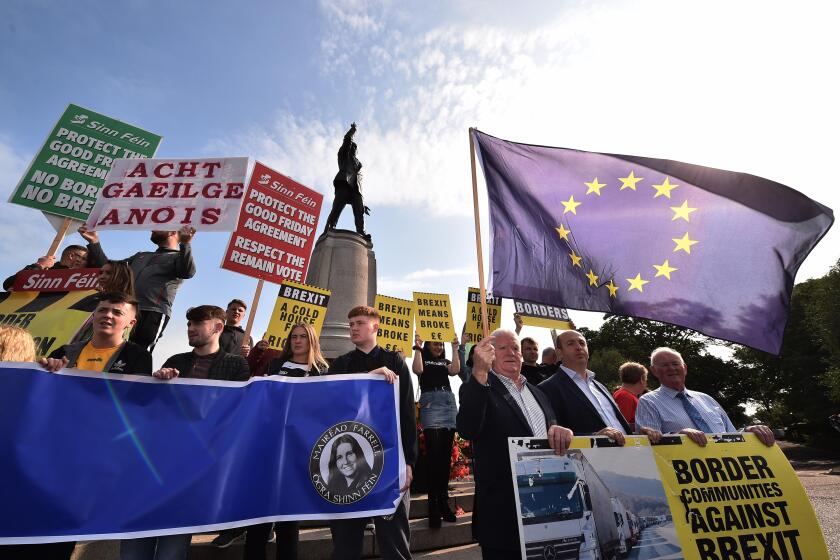Ireland doubles down on Hollywood, in part as a hedge against Brexit

- Share via
This is not an easy time to be the Irish prime minister. Brexit is tumbling toward some sort of conclusion, threatening the very peace and stability of Ireland. The country’s closest neighbor and largest trading partner, Britain, is tied in political knots.
If you’re Leo Varadkar, the taoiseach of Ireland (prime minister, pronounced tee-shock), it’s not a bad time to seek escape in the movies.
Varadkar spent two days in Los Angeles this last week, opening Ireland’s newest consulate and reaching out to the film industry, in part as a buffer for his country’s economy in a looming post-Brexit world. In an interview with The Times on Friday, he spoke about the challenges of Brexit, the opportunities for Ireland’s film industry and, from his perspective as one of the world’s only openly gay heads of government, hesitantly offered some advice to a would-be peer, Democratic presidential candidate Pete Buttigieg.
“I suppose if I’d say anything to Mayor Buttigieg, it would be: There’s actually no reason why the person you love should in any way limit your ability to reach the top of your profession. That’s what I’d say to anyone in the LGBT community. And America, you know, has been a leading light in the world for a lot of us who who are part of the LGBT community.”
Since his election in 2017, Varadkar has been on a mission to expand Ireland’s global footprint, a project that has taken on renewed urgency as Britain prepares to leave the European Union. Varadkar’s Republic of Ireland is an EU member, but neighboring Northern Ireland is part of the United Kingdom, which is scheduled to depart the EU on Oct. 31, barring another extension.
He was booed in Scotland.
The new L.A. consulate, which becomes Ireland’s seventh in the United States, is part of that global expansion, and is intended, in part, to provide a base for the country to enhance its role in the film industry.

Varadkar came to L.A. following U.N. General Assembly meetings in New York. While in California, he visited Warner Bros., Disney and Netflix and met with Fox Searchlight and Hulu, as well as with Element Pictures, an Irish production company perhaps best known for co-producing the 2015 movie “Room,” which won a best actress Oscar for Brie Larson.
“There’s already a good ecosystem between L.A. and Ireland,” he said. “You know, there’s a lot of Irish actors here, a lot of Irish companies here. Some people will be familiar with Element Pictures and so on. But we’d like to see the American companies in particular taking the opportunity to use more of our studio space in Ireland, do more filming in Ireland.”
Sometime around AD 600, a handful of Irish monks decided that the rigors of fasting and penance on the mainland were not exacting enough.
“Certainly what we’re doing is, in part, in response to Brexit,” he said, “but it’s something that I would argue we should be doing anyway.”
Brexit remains Varadkar’s most vexing challenge, largely because a so-called “hard Brexit” — one without a deal laying out a new relationship between Britain and the EU — would close the open border between Northern Ireland and the Irish republic and impose a customs regime and tariffs on goods flowing between the two.
That could badly damage the economies on both sides, but Ireland has a greater worry: that the border will bring back the sectarian strife in Northern Ireland that largely ended with the Good Friday Agreement, which went into effect in 1999. That ended decades of bloody conflict known as “The Troubles” in the North, which is nearly evenly divided between Protestants and Catholics. The Republic of Ireland remains solidly Catholic.
“The biggest risk for us in terms of Brexit is divergence — that Britain becomes more different from Europe, becomes more different from Ireland, and that, therefore, pulls the communities apart in Northern Ireland too,” Varadkar said.
That, he added, is “the fundamental problem of Brexit: The European Union [and] the Good Friday Agreement are all about convergence. They’re all about coming together, harmonization, standardization. Brexit is about diverging, splitting apart again, and that creates real risks for Northern Ireland.”
More to Read
Sign up for Essential California
The most important California stories and recommendations in your inbox every morning.
You may occasionally receive promotional content from the Los Angeles Times.














